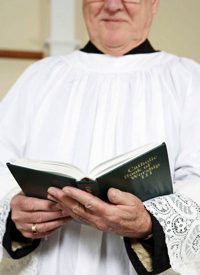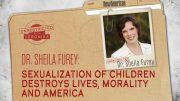
On Saturday, November 7, an important three hours were spent at the New Hampshire Institute of Politics at Saint Anselm College in Manchester. It was a forum on “Catholics in the Public Square.”
Speakers were Manchester attorney Robert Dunn, who represents the Roman Catholic Diocese of Manchester on Planet Concord, where New Hampshire laws are made; and Dr. Larry Chapp, a professor of theology at DeSales University in Pennsylvania.
Bishop John McCormack was there at the beginning of the conference, blessed it and hit the road, apparently having other stops to make that morning. Had he stayed he would have heard the right and duty of Catholics to act on their consciences in the public arena defended as happens all too rarely these days. Fortunately, many Catholics are Irish, and we Irish have long memories. Indeed, Irish Alzheimer’s is the phrase meaning, “We forget everything but our grudges.”
This nation has a long tradition of anti-Catholicism. It was more explicit in the 19th century when Catholics were denied the right to vote or hold public office in many states, including New Hampshire. It was still strong in the 1920s when the Democratic Party had the temerity to nominate a Catholic for President. The fear arose that if Al Smith won, the pope would be moving into the White House. It was even rumored that the Holy Father already had his bags packed in anticipation of a Smith victory. Election night dictated a change in the mythical travel plans. As Smith said in his concession speech, he sent a telegram to His Holiness at the Vatican with the instruction: “Unpack!”
John F. Kennedy overcame anti-Catholic prejudice in 1960 that manifested itself in such silliness as the story that Catholics were stringing bowling balls together as a rosary for the Statue of Liberty. In a speech before the Greater Houston Ministerial Association in September of that year, Kennedy pledged allegiance to the “separation of church and state” in language that went beyond the demands of the American Civil Liberties Union. He pointed out that the Constitution forbids a religious test for holding federal office and that there was no religious test at the secular shrine in Texas called the Alamo, where many Catholics and Protestants died together. And he reminded those good Protestant ministers that there was no question of divided loyalty when he and two of his brothers were among the tens of thousands of Catholic Americans serving their country under arms in World War II.
But today Catholics hold many offices in political life and seem to forget they are Catholics while in service to their city, state, and nation. They seem to think separation of church and state requires a divorce of morality from law. Thus, many Catholic politicians and their supporters are among the defenders of abortion “rights” and support legalizing marriage for same-sex couples. Dr. Larry Chapp said at the conference that a bishop who does not tell pro-abortion politicians in his diocese that they should not present themselves for Holy Communion at Catholic Mass is derelict in his duty. We applauded. Unfortunately, Bishop McCormack did not hear it. He was like Elvis: He had “left the building.”
He was “in the building” last month when the annual “red Mass” was held at Saint Joseph Cathedral in Manchester. There Archbishop Donald Wuerl of the archdiocese of Washington, D.C., gave the homily and it was at least an improvement on the one given a couple of years ago by Father Brian Hehir of the archdiocese of Boston, who sermonized about God knows what. I can only tell you where the sermon went. It exited the cathedral in the first few minutes, rose into the sky, and expired somewhere between the steeple and the ozone layer. It was a speech that said nothing and said that it said it with great erudition. Bishop McCormack praised it. I could not find anyone else in the cathedral who got anything out of it.
What I do remember, however, was that the talk carefully avoided the subject of abortion. And why not? All Father Hehir had before him as he spoke were the Chief Justice of New Hampshire, the chief justice of the state’s Superior Courts, a few score other judges and lawyers, many state legislators, police, and others involved in the formulation, administration, and enforcement of New Hampshire’s laws. Yet the only mention of abortion came during the petitions that followed the homily, during which some something was said on behalf of the sanctity of human life. It followed, by three or four petitions, a plea on behalf of “all those who struggle with English as a second language.” Okay. As long as Holy Mother the Church has her priorities fixed at Saint Joseph Cathedral in Manchester, NH.
So Archbishop Wuerl did not have a very high bar to clear if the standard were the homily delivered by Father Herhir. He cleared it, but without a lot of room to spare. As Churchill said of one of his contemporaries, “He spoke without a note and nearly without a point.” Actually, it sounded good. It was all about the importance of the law, the link of law to liberty and justice, the nexus between natural and positive law, etc. He spoke of the Founders, he spoke of court rulings and somewhere along the way, I do believe he made a vague and fleeting reference to the greatest legal issue facing America today, the legal sanction and protection of the deliberate, planned killing of innocent human beings. I do not exaggerate when I say anyone who may have sneezed at that point would have missed all the bishop had to say on the subject of abortion. I do believe he spent more time and words on racial segregation, which has not been a burning legal issue for some time in America and, as far as I know, never was in New Hampshire.
How do you explain this reluctance to address the 800-pound gorilla in the room? This month, Maine voters in a statewide referendum overturned a law, passed earlier this year, to make marriage applicable to same-sex couples. Arguing against repeal was the state’s Governor who had signed “same-sex marriage” into law. The Governor’s name is John Baldacci. His religious affiliation is, you guessed it, Roman Catholic. I wondered what the bishop of Portland had to say publicly about the Governor.
I quickly remembered that we have the same situation in New Hampshire, where pro-abortion Governor John Lynch signed “gay marriage” into law last May. And I can tell you that if the Bishop of Manchester has publicly denounced the Governor for his demonstrated indifference, if not outright contempt for the principles of morality and natural law, he must have done it awfully quietly, perhaps in his sleep. Perhaps the bishop has counseled Lynch privately. I have been told many times, “You can catch more flies with honey than with vinegar.” I do believe our Catholic bishops must have real estate inventories that include entire warehouses full of dead flies. But Our Lord commissioned them to catch not flies, but men to the saving of souls.
Governors Baldacci, Lynch, and many other Catholic politicians have sinned not just privately, but publicly. Their championing of evil causes in the name of “equality” or “choice” gives scandal to the brethren. Catholic lay voters see their Catholic Governor, Representative, or Senator taking such positions, and they see their Catholic bishops not denouncing them for it. And they assume, not unreasonably, that such positions are acceptable for Catholics to take. In the 1970s, when the Jesuit priest Father Robert Drinan was a member of Congress and became one of the first politicians to take a “pro-choice” stand on abortion, he obviously gave cover to Catholic politicians who also wanted to court the “pro-choice” vote and campaign contributions. And when Christopher Dodd of Connecticut, a U.S. Senator since 1980, was asked to please follow his Catholic conscience and oppose the legal support for abortion, Dodd replied, “My position is the same as Father Drinan’s.”
Bishop McCormack has the opportunity to remind faithful Catholics in New Hampshire that they may not have a position on abortion or “gay marriage” that is the same as Governor Lynch and still be faithful Catholics. The bishop, ordained a priest in 1960, is no longer a young man. Indeed, his retirement nears. His personal Day of Judgment may come sooner than he imagines. He should, for the sake of his own soul and the spiritual welfare of his flock, issue a charitable anathema of Governor John Lynch and other public champions of the culture of death before the bishop is called out of the building for good.



